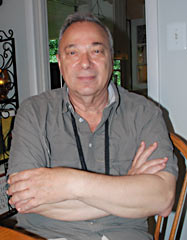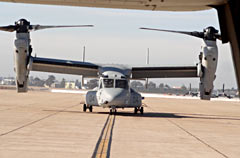Former chief analyst states that the MV-22 has a very serious issue in terms of safety

In an interview with the Ryukyu Shimpo, in Virginia, former chief analyst Arthur Rex Rivolo pointed out that the V-22 Osprey aircraft will crash if its engines stop working.
May 28, 2012 Hideki Matsudo of Ryukyu Shimpo reports from Washington D.C.
On May 27, former chief analyst Arthur Rex Rivolo, who testified before the House of Representatives in June 2009 on the inability of the MV-22 Osprey vertical take-off and landing transport aircraft to safely autorotate, responded to a request from the Ryukyu Shimpo for an interview. With regard to the planned deployment to U.S. Marine Corps Air Station Futenma, the former chief analyst said, “In a combat operation it is very dangerous. However, the chances of an engine failing in peacetime are very rare. In peacetime, the Osprey, I think, is very safe.” However, he said, ” If the engines stop in the MV-22 over a city, that will be a problem, it will crash . . . uncontrolled crash wherever it happens to be.” Rivolo added, “The airplane won’t do an autorotation, so basically it’s a very serious hole in the safety of the airplane.”
Autorotation is the state of flight in which the main rotor system of a helicopter is turned by the action of air moving up through the rotor rather than engine power driving it. A helicopter can be landed safely in the event of complete engine failure. Rivolo pointed out that for the Osprey, “The simulator training does not do the autorotation correctly.” He stated, “The MV-22 would fail to meet basic air worthiness directives of the FAA if it were a civilian transport. Although the airworthiness requirements of the FAA do not apply to military aircraft, equivalent requirements have been imposed on all passenger-carrying military aircraft in the past. The MV-22 represents the first departure from this policy within the Defense Department.”
With regard to its deployment to Futenma Air Station, he commented that an accident is unlikely because the pilot will not be required to undertake high-level maneuvering as long as the aircraft is being operated from an airfield because it is not necessary to avoid a possible enemy attack in the combat zone, and also that the airplanes will be very well serviced on a base, which is different from in a battlefield situation or on a warship.
At the same time, he touched upon the chances of an engine failing in flight, saying, “We have the possibility of an airplane crash because of bad fuel that’s got water or contaminants, so it stops the engines. The two engines are tied together with a drive shaft. That drive shaft is made out of composite. If there is a fire in there, the airplane will crash.” He stated that every five years or so they have a helicopter crash caused because of bad fuel. The U.S. Marines stated that it would be almost impossible for the MV-22 engines to stop. Rivolo commented, “It will crash . . . uncontrolled crash if its engines stop working when it’s in helicopter-mode.” He said that some young people will be killed in combat operations in these crashes. The former chief analyst confirmed previous statements in the House in his interview with the Ryukyu Shimpo, saying, “It is a disregard for soldiers’ lives. Yes, and I still believe it.”
(English translation by T&CT, Mark Ealey)
Previous Article:Okinawa Kizuna Declaration
Next Article:Twenty people return to Shimoji Island 50 years after it was deserted
[Similar Articles]
- Defense Minister says that he possesses no data on the flight distance capabilities of the Osprey on autorotation in an emergency
- Osprey’s flight control computer possible cause of crash
- Osprey accidents in Afghanistan conspicuously high at one per 90 flight hours
- Japanese government proclaims Osprey to be safe, and will deploy them to Futenma
- Bucket falls from airborne MV 22 Osprey in San Diego

 Webcam(Kokusai Street)
Webcam(Kokusai Street)


